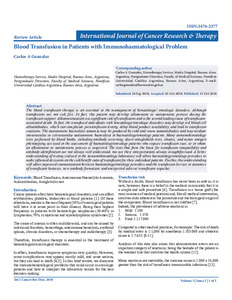Por favor, use este identificador para citar o enlazar este ítem:
https://repositorio.uca.edu.ar/handle/123456789/1470| Campo DC | Valor | Lengua/Idioma |
|---|---|---|
| dc.contributor.author | González, Carlos A. | es |
| dc.date.accessioned | 2019-05-02T13:56:33Z | - |
| dc.date.available | 2019-05-02T13:56:33Z | - |
| dc.date.issued | 2018 | - |
| dc.identifier.citation | González, C. A. Blood transfusion in patients with immunohaematological problem [en línea]. International Journal of Cancer Research & Therapy. 2018, 3 (2). Disponible en: https://repositorio.uca.edu.ar/handle/123456789/1470 | es |
| dc.identifier.issn | 2476-2377 | - |
| dc.identifier.uri | https://repositorio.uca.edu.ar/handle/123456789/1470 | - |
| dc.description.abstract | Abstract: The blood transfusion therapy is an essential in the management of hematologic/ oncologic disorders. Although transfusions are not risk free. In fact, this patient may develop alloimmune or autoimmune process during the transfusion support. Alloimmunization is a significant risk of transfusions and is the second leading cause of transfusionassociated death. In fact, the transfused individuals with hematologic/oncologic disorders may develop red blood cell alloantibodies, which can complicate pretransfusion testing, delay blood product availability, and lead to transfusion reactions. The autoimmune haemolytic anaemia may be produced by cold and warm autoantibodies and may mediate intravascular or extravascular autoimmune haemolysis in haematology/oncology patients. Many immunohematology tests performed by blood banks, including antibody screening, direct antiglobulin tests, eluates, and minor antigen phenotyping, are used in the assessment of haematology/oncology patients who require transfusion care, or in whom an alloimmune or autoimmune process is suspected. The tests that form the basis for transfusion compatibility and antibody identification are not always well understood, nor are their interpretations always straightforward. A better understanding of testing realized in the immunohematology laboratory will allow haematology/oncology providers to make informed decisions on the risk/benefit ratio of transfusion for their individual patients. Further, this understanding will allow improved communication between haematology/oncology providers and the transfusion Service in instances of transfusion histories, new antibody formation, and unexpected adverse transfusion sequelae. | es |
| dc.format | application/pdf | es |
| dc.language | eng | es |
| dc.language.iso | eng | es |
| dc.publisher | Opast Publishing Group | es |
| dc.rights | Acceso Abierto | es |
| dc.rights.uri | https://creativecommons.org/licenses/by-nc-sa/4.0/ | es |
| dc.source | International Journal of Cancer Research & Therapy. 2018, 3 (2) | es |
| dc.source | ISSN 2476-2377 | es |
| dc.subject | MEDICINA | es |
| dc.subject | TRANSFUSION DE SANGRE | es |
| dc.subject | ANEMIA HEMOLITICA | es |
| dc.subject | ANTICUERPOS | es |
| dc.title | Blood transfusion in patients with immunohaematological problem | es |
| dc.type | Artículo | es |
| uca.path | Facultad de Ciencias Médicas|Artículos | es |
| uca.disciplina | MEDICINA | es |
| uca.filename | /home/data-uca-generic/folder_generic/blood-transfusion-patients-immunohaematological/metadata.xml | es |
| uca.issnrd | 1 | es |
| uca.affiliation | Fil: González, Carlos A. Hospital Muñiz. Servicio de Hemoterapia; Argentina. | es |
| uca.affiliation | Fil: González, Carlos A. Pontificia Universidad Católica Argentina. Facultad de Ciencias Médicas. Dirección de Posgrado; Argentina. | es |
| uca.version | publishedVersion | es |
| item.fulltext | With Fulltext | - |
| item.grantfulltext | open | - |
| item.languageiso639-1 | en | - |
| Aparece en las colecciones: | Artículos | |
Ficheros en este ítem:
| Fichero | Descripción | Tamaño | Formato | |
|---|---|---|---|---|
| blood-transfusion-in-patients-with-immunohaematological-problem-ijcrt-18.pdf | 718,23 kB | Adobe PDF |  Visualizar/Abrir |
Visualizaciones de página(s)
184
comprobado en 30-abr-2024
Descarga(s)
147
comprobado en 30-abr-2024
Google ScholarTM
Ver en Google Scholar
Este ítem está sujeto a una Licencia Creative Commons

